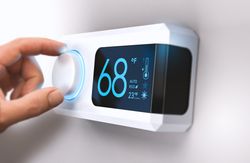
Homeowners who need to replace their heating and cooling system but want something efficient have likely heard of both geothermal and traditional heat pumps from their HVAC contractor. Though they are both beneficial, they are unique systems and should not be confused. Below are brief explanations of how each system works to help you decide which is best for your home.
How Geothermal Heat Pumps Moderate Temperatures
The underground temperature of soil stays fairly constant, despite weather conditions aboveground, which is how geothermal heat pumps regulate indoor climates. Loops of piping are installed underground to either absorb or disperse heat into the 50- to 60-degree soil.
In summer, hot water and vapor are carried underground to be cooled. Once the heat has dispersed out of the water, it carries the now cold liquid back up to the home, where the heat pump distributes the cool air throughout the home. In winter, it works in reverse; the system draws in cool air and cold water, which then absorbs the underground warmth. Once heated, it is dispersed throughout the house before returning to the ground for additional cycling.
While this system is energy-efficient and eco-friendly, it can take a while for HVAC contractors to complete installation due to the long loops of pipes that need to be installed underground. However, the cost savings and carbon footprint reduction are enough motivation for many homeowners to take on this project.
How Traditional Heat Pumps Work
 Traditional heat pumps perform the same heat exchange to heat or cool your home, but it uses the air temperature rather than the soil. Humidity, weather, and various other factors will cause the air temperature to fluctuate throughout the year. The cooling system utilizes refrigerant as it attracts heat and carries it to the outdoor unit to be dispersed. However, when the outdoor air becomes too cold, the pump falls back on electric resistance coils, which generate heat to warm the home. This option works well in climates with mild winters, but it can be challenging for the system to keep up on bitterly cold days. However, homeowners can see significant energy savings without the long installation process that geothermal systems require.
Traditional heat pumps perform the same heat exchange to heat or cool your home, but it uses the air temperature rather than the soil. Humidity, weather, and various other factors will cause the air temperature to fluctuate throughout the year. The cooling system utilizes refrigerant as it attracts heat and carries it to the outdoor unit to be dispersed. However, when the outdoor air becomes too cold, the pump falls back on electric resistance coils, which generate heat to warm the home. This option works well in climates with mild winters, but it can be challenging for the system to keep up on bitterly cold days. However, homeowners can see significant energy savings without the long installation process that geothermal systems require.
If you want to discuss both traditional and geothermal heat pump options with an HVAC contractor, turn to the team at Passanisi Services in Elyria, OH. Serving Lorain, Eastern Huron, and Western Cuyahoga counties, this team of HVAC contractors will not only help you explore your heating and cooling options, but they will also offer warranties to cover you after the work is finished. Between their two-year labor warranty and ten-year parts coverage for equipment replacement, you can be sure they will stand behind their installations and repairs. Visit their website to learn more about their geothermal solutions, and call (440) 984-2322 to request an estimate.
About the Business
Have a question? Ask the experts!
Send your question

